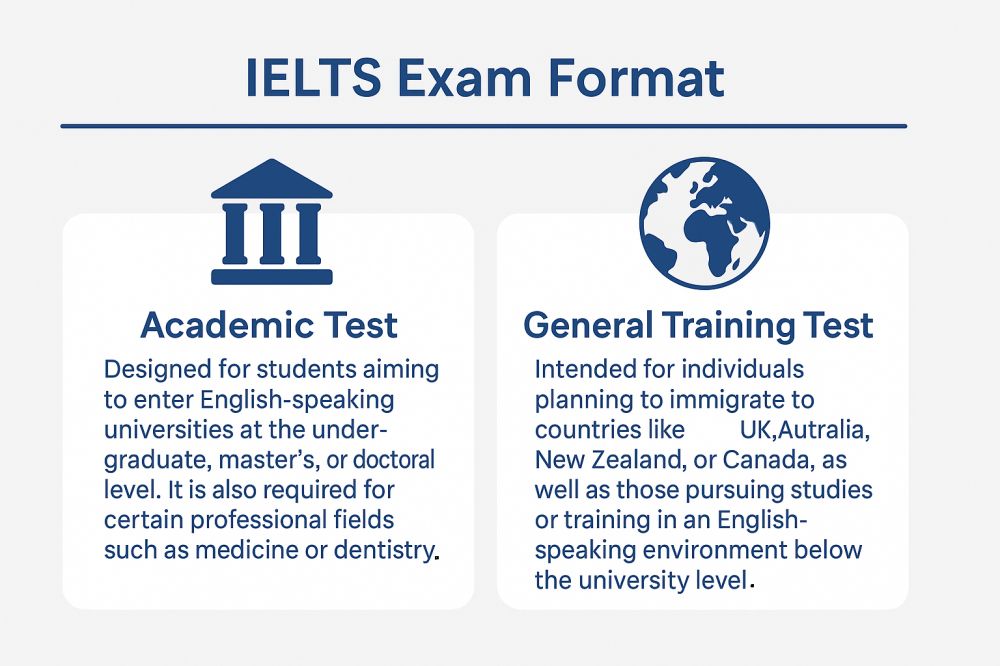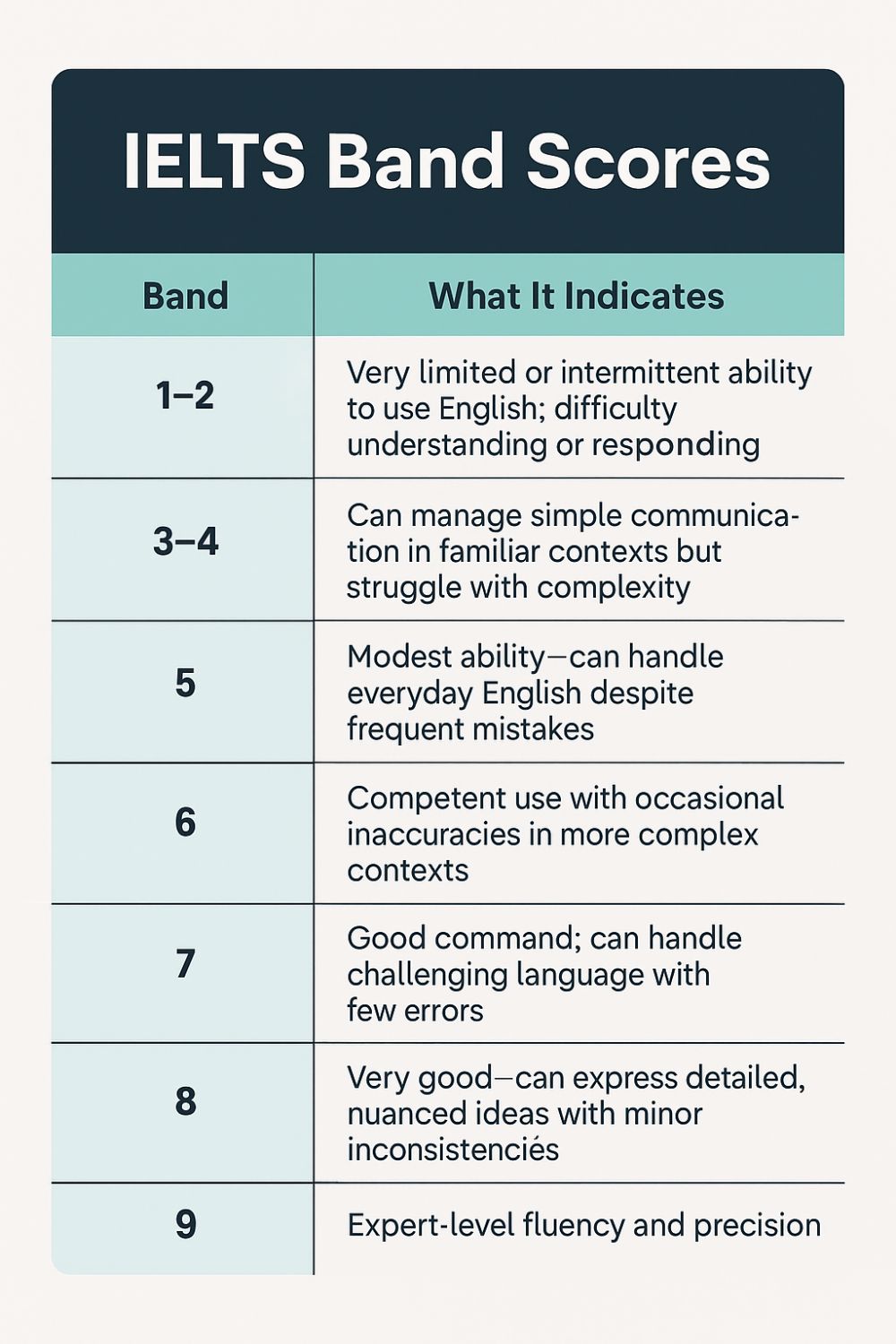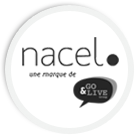Boost your IELTS exam score with Access English Toronto
IELTS Exam: why is this exam a good choice for you?
What is IELTS recognized for?
IELTS exam is widely recognized worldwide for:
- Immigration: If you plan to move to Canada, the U.S., the U.K., Australia, or New Zealand, a valid IELTS score is often required. It may be important for you to achieve a high score.
- University admission: Universities typically require an IELTS certificate. Check with your dream university the required IELTS score.
- Career opportunities: If you're looking to work in an English-speaking country or multinational company, a high IELTS band (often 6.5 per section for the U.S., U.K., and New Zealand, or around 6.0 for Australia and Canada), can be a game-changer!
- Worldwide recognition: With recognition from over 10,000 organizations in more than 140 countries, IELTS is recognized worldwide for English proficiency.
- Proof of proficiency: The IELTS employs a strict, evidence-based scoring system on a 1–9 scale and doesn’t pass or fail; it simply reflects your level of proficiency.
Proving your English level can be crucial for you: if you want to have a job with a global company or study in a foreign university.
IELTS band score: what do they mean?
Structure of the IELTS exam
The IELTS exam follows a consistent format:
- the Reading, Writing, and Listening components together last 60 minutes,
- while the Speaking test takes between 11 and 14 minutes.
Reading: In both the Academic and General Training versions, candidates must demonstrate the ability to identify key ideas, extract essential details, understand overall meaning, recognize the writer’s perspective, and summarize arguments effectively.
Writing: Responses are assessed across several criteria, including how well the task question is addressed, the appropriateness of language style, and the clarity of idea organization. Examiners also evaluate grammar accuracy, vocabulary range, and the use of cohesive devices to link sentences and paragraphs.
Listening: The test consists of four recordings: two set in everyday social situations and two in academic or educational contexts. These may include conversations, discussions, or monologues, and they feature a range of English accents.
Speaking: Candidates are evaluated on their ability to communicate ideas clearly and naturally. Assessment focuses on relevance and depth of answers, grammatical control, vocabulary use, pronunciation, intonation, and overall fluency.
IELTS scores
IELTS uses bands from 1 to 9, plus 0 if you didn’t attempt the test. Band 1 represents a non-user, while Band 9 denotes an expert user. Scores above two years old might be invalid; check specifics for where you’re applying.
You receive separate scores for Listening, Reading, Writing, and Speaking. The overall score is the average of these four, rounded to the nearest half band.
For example: (6.5 + 5.5 + 6.0 + 6.5) ÷ 4 = 6.125 → 6.0 overall.
While many learners with only a basic command of English manage to complete the IELTS successfully, their scores often plateau around Band 5.5 or 6. Achieving higher results, however, is far from effortless.
Reaching beyond Band 6 requires real dedication, consistent practice, and a strategic approach. For those who push through the challenge, earning a Band 7 or above is not only rewarding but also a powerful testament to their hard work and progress!
Achive a better score at IELTS exam
You can improve your IELTS performance if you:
1. Familiarize yourself with the exam format
Every section of the IELTS follows a fixed structure covering timing, question types, tasks, and even the marking system. This standardization ensures that every candidate, no matter where they take the test, is assessed under the same conditions. Understand the structure of each subtest - Listening, Reading, Writing, and Speaking - and tailoring your practice accordingly is key to success. Review sample test questions now.
2. Master time management
For example, certain writing tasks allot more points and time. Practice pacing to avoid being rushed. Reading part requires a strategy: read the questions before starting to read, start with a superficial read, and then go into details. Improving your reading speed is crucial. The Listening part requires training so that you get used to identifying answers to the questions you would have read first. Read more advice from Nacel English School in London.
3. Focus on meaning over memorization
In written and spoken sections, originality matters. Rather than memorizing answers, focus on expressing ideas clearly and naturally.
4. Regular practice with feedback
Use sample exams and timed practices. Incorporate mock tests under real exam conditions to track progress and identify weaknesses.
Choose an IELTS Preparation course to achieve your goals
An IELTS Prep course is a focused English course dedicated to making you more successful on test day. During an IELTS preparation course, you receive:
- Personalized support: We tailor your preparation to focus on your weakest areas (grammar, listening, speaking, or writing) maximizing your efficiency and results.
- Immersive, small-group learning: In classes capped at 10 students, you’ll enjoy ample speaking practice and individualized attention.
- Practical, exam-tailored strategies: From recognizing tricky question wording to mastering time-efficient response techniques, we prep you for how IELTS is actually set up.
- Away from generic instruction: Unlike generic prep-centered courses, our approach combines real-world communicative English with exam-specific drills to build both confidence and accuracy.
The IELTS exam is available in both online and paper-based formats, with over 800 test centers worldwide, making it easy to find one near you. Check the nearest IELTS exam text center.
Get the tips to get the best IELTS score. Book your IELTS Preparation course in Toronto.







